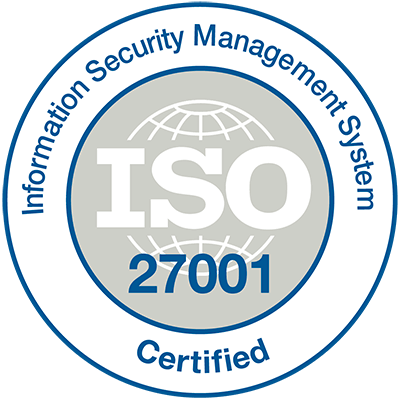ULTIMATE GUIDE
Case Management System:
Streamlining Processes and Centralizing Data
In today’s ever-evolving business landscape, effective case and data management is paramount for organizations to remain compliant and protect sensitive information. One essential tool that has proven invaluable in this area is the Case Management System. This innovative system can improve overall case management within organizations by providing a structured framework for handling various cases and ensuring that information is managed efficiently.
The importance of this software cannot be overstated, especially when it comes to effective data management. By centralizing all case-related information in one system, organizations can access real-time data, track progress, and easily retrieve information when needed. This not only increases operational efficiency and reduces the possibility of data duplication and loss, but also enables the identification of patterns and recurring issues. Such insights can help pinpoint necessary internal controls, highlight areas for awareness campaigns or training initiatives
This guide explores how this technology can optimize case management processes, strengthen compliance frameworks, and establish a foundation for secure and transparent operations.
What is a Case Management System? Definition
A Case Management System is a platform designed to streamline the centralization, organization, and tracking of cases. It is a highly versatile tool that can be used in a variety of contexts, including:
- legal management;
- human resources;
- customer support.
Regardless of the type of system, whether legal case management software or otherwise, the highest standards of data security are continually assured.
Indeed, a Case Management System plays a critical role in ensuring regulatory compliance. With strict regulations governing data privacy and case management processes, organizations must adhere to these guidelines to avoid penalties or legal consequences. The system provides a secure environment for managing cases while ensuring full compliance with applicable standards.
Beyond data management and regulatory compliance, these systems also help protect the confidentiality of sensitive cases, such as whistleblowing incidents. Maintaining confidentiality is imperative in encouraging individuals to come forward with information without fear of retaliation. The system’s robust security measures help protect sensitive information and create a safe environment for whistleblowers to report misconduct.
The key features of case management software include:
- case tracking;
- data consolidation;
- document storage;
- workflows.
Which simplify the case management process. Teams can readily access case information, even when working remotely, and automated workflows minimize the potential for human error while enhancing overall efficiency.
A Case Management System also serves as a comprehensive case management tool, offering a range of benefits from task management to more complex functions, and is therefore an essential component of any modern management system.
Whistleblowing Cases: The Benefits of a Case Management System
Whistleblowing is a key mechanism for maintaining transparency and integrity within organizations. However, without adequate case management support, whistleblowers may face risks that could compromise their safety and potentially undermine the impact of their reports.
A Case Management System plays a critical role in managing whistleblowing cases. As a matter of fact, legal case management software provides a structured framework to protect whistleblowers and rigorously monitor and document cases, preventing the leakage of sensitive case information. By implementing a management system, companies can ensure compliance with both local and international regulations, including those pertaining to whistleblower protection, data retention, and restricted access.
An effective case management tool like Whispli not only ensures compliance with the law but also guarantees the security and confidentiality of reports. With advanced features such as task management, workflows, and analytics, this system serves as robust and valuable case management software for handling whistleblowing incidents securely and effectively.
Whistleblowing laws and compliance: ensuring your Case Management System meets legal requirements
It is paramount for organizations to achieve compliance with whistleblowing laws. Thankfully, the implementation of a Case Management System ensures a systematic approach to handling cases. How? By centralizing case information and streamlining processes, thereby improving efficiency and compliance with regulatory requirements.
To ensure compliance, a Case Management System must provide:
- secure data collection and storage;
- user access management;
- complete traceability that can be used to demonstrate compliance during audits.
In this context, a management system needs to deliver secure reporting channels and safeguard whistleblower confidentiality while maintaining restricted access to critical data, such as evidence and reports. Notable examples of whistleblowing laws that underscore the importance of compliance efforts include the EU Whistleblowing Directive and the Sarbanes-Oxley Act in the USA.
Furthermore, a comprehensive case management tool not only manages cases but also enables data-driven decision-making through tailored dashboards and reports. It provides a detailed overview of performance and results in line with whistleblower protections and legal case management software principles.
Using an integrated Case Management Software for your organization: 6 benefits
#1 Streamline and standardize case handling
Standardization helps to avoid errors by streamlining processes across the board. By clearly defining each step for all teams, case management software eliminates ambiguity and ensures a consistent approach to operations, at all levels in the organization, worldwide.
Case management tools that guide users through each step are particularly useful for reducing the potential for human error. The software also facilitates the automation of certain repetitive manual tasks, freeing up valuable time and resources for more important activities.
#2 Consolidate data and make data-driven decisions
The implementation of case management software serves as a central hub for consolidating and organizing case information, providing a comprehensive overview of operations.
By integrating data analytics tools, case management systems empower organizations by:
- leveraging insights for better performance evaluation;
- analyzing trends and patterns, such as recurring issues, extended resolution times or anomalies in specific locations;
- providing valuable information to improve efficiency and productivity;
- optimizing their strategies and making informed, data-driven decisions that align with their overall goals and objectives.
#3 Enhance confidentiality and security
Deploying case management software is a strategic investment in ensuring the confidentiality and security of sensitive data, aligning with SOC2 (System and Organization Controls) standards within organizations. The controlled access feature not only restricts access to authorized personnel, but it also includes automatic audits that monitor any unauthorized attempts to view or handle sensitive case information, ensuring the security of your data.
Moreover, comprehensive data protection measures built into case management solutions provide a robust defense against cyber-attacks, significantly reducing the risk of potential breaches.
End-to-end encryption is integrated into the communication process between the tool and users, guaranteeing heightened security for all interactions and ensuring the continuous protection of data throughout its lifecycle.
#4 Ensure consistent processes across all teams and at all levels
Case management software gives organizations the tools to establish consistent processes across multiple teams and levels, whether they are using legal case management software or a customer support system. In multicultural or multinational contexts, standardization of case management practices is particularly valuable to ensure uniformity and consistency of operations.
The management standards provided by the software are designed to be applicable on a national or international level, allowing for consistency regardless of the organizational context.
In addition, the inclusion of pre-built or custom workflow models within the software allows for seamless and consistent execution of tasks and processes, promoting standardized practices across the organization.
#5 Improve compliance and regulatory adherence
Case management solutions help mitigate the legal risks associated with non-compliance and provide real-time monitoring of regulations. Results? This helps organizations to stay on top of evolving regulatory requirements, such as whistleblower laws or CSRD requirements and adapt quickly to changes.
Legal case management software also simplifies compliance through the use of audit logs and traceable processes built into the system. These features not only facilitate monitoring, but also ensure transparency and accountability in regulatory processes.
#6 Facilitate timely and effective investigation and resolution
Another key benefit is the reduction in the time it takes to resolve critical cases, allowing for quick and decisive action. Indeed, the software’s efficient and automated tracking capabilities enable the systematic monitoring of reports and investigations, ensuring that no important detail is overlooked.
Additionally, the comprehensive documentation features of case management systems provide valuable support for drawing conclusions and making informed decisions.
What are the Main Features of a Case Management System?
Case tracking and progress monitoring
A case management system centralizes reports and follows up on cases in real time to further enhance process management. It offers a number of components that help improve productivity.
- Manage users and permissions to ensure the security of case information.
- User-friendly interface, one point of access.
- Advanced analytics provide complete data insight.
- Multi-device compatibility to connect with different types of devices.
Secure data storage, encryption & data retention policies
Case management solutions guarantee confidentiality and security. How? With features like advanced data encryption to protect classified information and relevant policies on storing it.
These systems enact role-based access control to prevent unauthorized access to important data. Case management tools also archive sensitive information in a manner that keeps it safe yet accessible.
Dashboards to consolidate data for regulatory or company reporting
Case management systems bring case information from different sources into intuitive dashboards, simplifying the exploration of that data. They provide users with the means to track case progress and make informed decisions. Each system also generates reports aimed at meeting regulatory and internal needs.
Automatic actions
These systems allow for the automation of actions, making case management more efficient. Manual effort is reduced because users can automate workflows and free up time for more valuable work.
Configuring complex case handling processes
The incorporation of elaborate case handling procedures is another key feature. Each organization should be able to create workflows tailor-made to its needs. An example of where this works well is in legal case management software, which can be used to streamline processes in accordance with whistleblowing laws.
Integration with other tools and platforms
Strong integrations implement connectivity to existing solutions, from HR software and GRC tools to Teams, Slack, and more. This enables seamless collaboration and smooth data exchange between tools, while improving case management. Customer support can also benefit from integration capabilities for timely resolution of customer issues.
Alert Management: Centralized or Decentralized System?
Centralized systems, streamlined oversight, stronger control
Organizations need to choose between a centralized and decentralized alert management system. The main benefit of centralized systems? A single platform where incident alerts are monitored and managed! This approach promotes consistent global case management and enhances oversight of alert processes.
Decentralized systems, empowering teams with local autonomy
Decentralized systems allow teams to operate with local autonomy. Alerts are managed by a specific department or region, so an organization can tailor its alert handling process. This process enables custom alerts and gives local ownership of alert management.
Hybrid approach, balancing control and flexibility
A hybrid alert management system balances centralization and decentralization: it offers both global control and local flexibility. This integration can optimize alert management within organizations.
The hybrid model automates case assignments and routes alerts to available teams for quicker resolution. Results: it raises the efficiency of case operations. Multicriteria assignment filters non-vital alerts and directs attention to critical tasks.
How to Choose the Right Case Management Tool?
Security features assessment
The best case management tools impart a certain level of security for the sensitive data involved in operations, such as legal case management. In any case management software, security involves:
- strong encryption of data;
- blocking unauthorized access;
- integrity through automatic data backup – to reduce chances of data loss on failure.
Scalability and possibilities of customization
Each organization should choose the case management platform that grows with its managerial needs; it ought to adapt with the organization and be customizable to that effect. The flexibility in such a case management software system makes it easy for teams to change the way they review cases as their company evolves.
Cost and budget considerations
Comparison of the cost of SaaS systems to the buying of one license may help the organizational decision process. They should compare the up-front and subscription costs to see what best fits the organizational budget.
Vendor reputation and support
The selection should also be based on vendor reputation and support. This can be ascertained by analyzing every vendor’s customer reviews and after-sales service. This will provide a good guide on the quality of case management solutions and vendors’ approach to solving customer issues.
Implementing a Case Management System: from Plan to Execution
Planning and preparation
Planning necessarily precedes the implementation of a Case Management System. Proactive preparation is helpful for benchmarking current and future needs against long-term goals and strategies. Identification of all possible stakeholders in a case management platform aids in bringing in inputs necessary to meet the requirements of all involved.
System integration and configuration
Case management systems need to integrate with other existing software so that nothing acts as a barrier to the flow of information. The chosen case management software system must be compatible with tools like HR software and compliance systems. Workflows and templates can be customized to help making the system better suited for a company’s particular needs.
User training and onboarding, nationally or internationally
Users need to receive training on how to use a new case management tool. Different training programs should be developed per region and for multiple levels within the organization, whether a user’s role is to review cases or handle customer issues. Global organizations should have multilingual capabilities to train users in the language of their choice.
System monitoring and maintenance
Success in case management software is largely down to monitoring and maintenance.
- Real-time performance insights via dashboards enable timely interventions.
- Regular update cycles ensure the system stays adapted.
- Security audits safeguard the system’s reliability.
- User feedback enhances the system’s relevance and usability.
Long-term system development
The work continues beyond implementation; case management solutions require ongoing development and customization to meet the evolving needs of organizations. It should be an iterative process informed by case trends and regulatory developments. The latter has particular importance in regard to legal case management.
Conclusion
Adopting a Case Management System goes beyond simply integrating a new piece of technology; it’s about rethinking how your organization handles information and makes strategic decisions. Whether it’s managing whistleblowing reports or enhancing customer support, these tools provide the essential structure needed to navigate a world where data security and regulatory compliance are more critical than ever.
More than just improving operational efficiency and consolidating data, it’s an opportunity to establish practices that are transparent, consistent, and future-focused. In essence, a Case Management System doesn’t just optimize your processes, it equips your organization with the tools to adapt and thrive in a constantly evolving landscape.
Ready to take control of your case management?
Schedule a demo and see the difference of a tailored solution!You're in Good Company
Whispli is an award-winning platform recommended by partners and clients alike



















